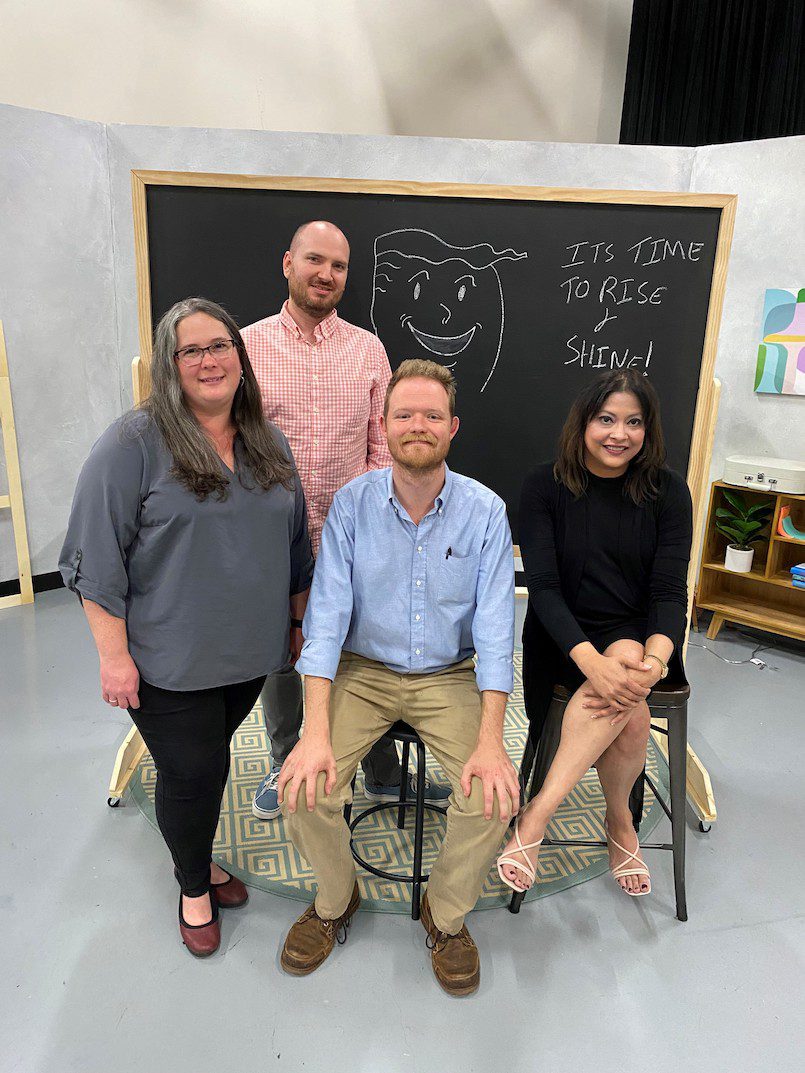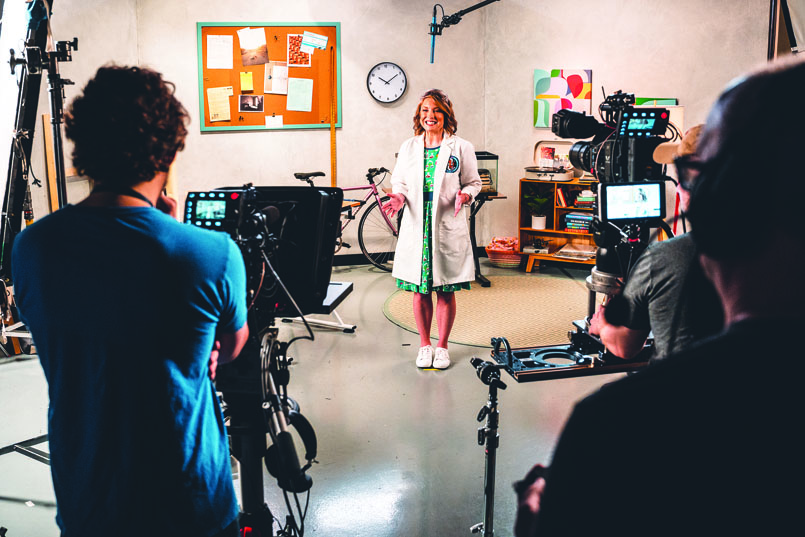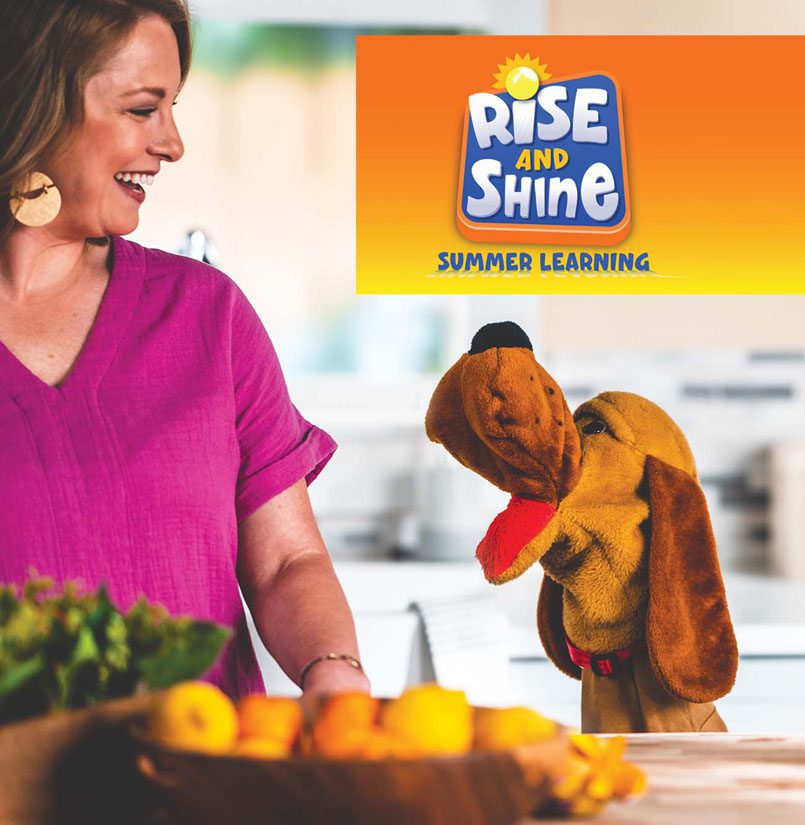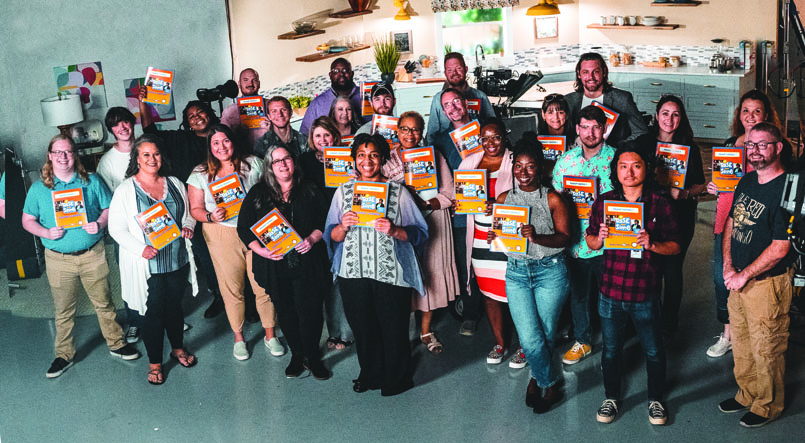31 Jul 2021 Rising to the challenge
By Stefanie Brazile
Keeping students learning at a normal pace during the pandemic was a huge challenge for educators. The Arkansas Department of Education (ADE) looked for innovative means to reach kids at home and came up with a plan to partner with Arkansas PBS.

The two organizations had worked together during the final eight weeks of the 2020 school year to develop an at-home learning option called Arkansas AMI, or alternative methods of instruction, so joining forces again to create “Rise and Shine” was an obvious fit. Arkansas PBS was asked to expand upon AMI and give students in kindergarten through fifth grade an entertaining reason to tune in each weekday morning and boost their summer learning.
“We were thrilled to collaborate with the Arkansas Department of Education and partners across the state to bring an essential summer learning experience,” Arkansas PBS Education Director Sajni Kumpuris said.
Providing a grant to the award-winning network was a natural choice because they have licensed educators, writers and producers on staff, along with the equipment and ability to broadcast on one of four TV channels.
“We are proud to be partnering with Arkansas PBS and other great community partners to do what we can to help our students reinforce and retain academic milestones during the summer,” said Johnny Key, secretary of the ADE.
Arkansas PBS was approached by the department with a grant that would give them the opportunity to expand upon the quality programming the network had developed in 2020. They wanted to use that content as the foundation to build upon, but with more time to fill it out and help young students this summer, according to Kumpuris.
“Rise and Shine” consists of national PBS KIDS programs, as well as 101 hours of high-quality content that was largely written and produced at the Arkansas PBS studio on the campus of the University of Central Arkansas. The free programs began airing from 8 a.m. to 11:30 a.m. on July 6, and will continue running in this slot on weekdays until Aug. 13. The idea is to reach students who do not have internet access outside of school and the station is also expanding transmitter coverage with funds awarded by the Arkansas CARES Act Steering Committee.
A team of nearly 100 people worked on “Rise and Shine.” It began with curriculum specialists studying the learning targets that the ADE wanted taught. Elizabeth Rollans, manager of curriculum and instruction at Arkansas PBS, translated those expectations to the team. “We were given the ‘Back to School Playbook’ of essential curriculum standards,” Rollans said. Presented by Secretary Key in 2020, the “Playbook” was compiled by around 130 educators and identifies skills that students missed when the state’s schools closed in March 2020.

One unique aspect of “Rise and Shine” is that Arkansas PBS invited Arkansas Teachers of the Year from the past six years to create lessons and teach them on camera, with some help from puppets, music, animation and guests to make the lessons more engaging.
“While the teachers were in studio being taped for segments, we asked them to look at these learning targets and develop their lessons for ‘on-camera’ based on those,” Rollans said.
Corey Womack, lead writer/producer, said that some of the learning targets were outside what the teachers would address in their segments. “There were topics like healthy eating, earth science and basic physical science lessons that gave the production team (writers and producers) the ability to flex our creative muscles,” he said. “We created five short series of cartoons and puppets — we’ve created a whole new slew of characters that are helping cover these targets.”
The core team of around 30 people at Arkansas PBS met and brainstormed ways to keep youngsters engaged while hitting key goals each day. Levi Agee, director of production, said that Arkansas PBS Executive Director Courtney Pledger reminded the team about Sesame Street’s short segments that taught a letter or shape.
“We created many interstitials, or short sequences, that are 10 minutes or less and connect to some learning target goal,” Agee said. “Basically, they become these short films that talk about science, math, reading or dance/movement — all these sorts of things that have this creative expression. So, we’ve got a segment called Robbie Rocket and it’s a gorgeous animation of a little rocket that flies around and tries to find a home planet to land on. The animation was all done locally, which is kind of fantastic. It’s a little minute of this sci-fi adventure that teaches gravity and sizes of planets and things like that. I would have been in heaven to have this as a kid, so now we get to make this all within Arkansas, which, to me, shows the richness of creativity that we have here.”

The team leaders brought in more than 60 people to work with them. “This is the first time that I’ve worked on something that I think will change the face of how filmmakers and producers get involved,” Agee said. “This is such a growing, impactful television station, and now we’re giving a house to more and more of the creatives in Arkansas, and now people are saying, ‘I want to come work with you. I saw this cool animation on TV.’
“It’s a huge, huge door opener for not only the kids who get to watch this, but the creatives in Arkansas.”
The project started in April and filming began the second week of June. To fill in gaps, Rollans hired four additional educators. One person consulted on math and science, and special educators with training in teaching literacy were also added. Her team broke down what had to be taught and passed that on to the writers.
Womack and others then wrote interesting content that could compete with other TV programs during the same time slot. Arkansas PBS producers had to ensure the writers’ vision was carried out. They also got to build on that creativity.
“You’ve got to realize that most TV programs have a lead time of six-months to a year, but the team turned it around in two months,” Agee said. “I think that’s because of the sheer passion of all of the individuals on our team. We really care. Not all of us have kids, but we were once kids who watched ‘Mister Rogers Neighborhood’ or ‘Bill Nye the Science Guy,’ so everyone in the building has had that emotional connection to help the next generation.”
Besides being introduced to new characters, animations, music and puppets, “Rise and Shine” viewers also go on 32 five-minute “field trips” to unique buildings and locations around the state like the Crater of Diamonds State Park in Murfreesboro and the Toltec Mounds outside Little Rock.
In addition to broadcasts, which will continue through the second week of August, most of the programming will be available indefinitely on-demand on youtube.com/arkansaspbs and at myarpbs.org/riseandshine.

“Arkansas educators can know that all of this content aligns with ADE academic standards,” Womack said. “They have access to myarkansaspbs.pbslearningmedia.org, a powerhouse of free classroom resources, and they’ll know it’s worry-free.”
Another bonus that Rollans’ team created are six Power Packets, which are colorful, bilingual workbooks that extend each week’s lessons. More than 6,000 copies have been mailed or delivered to area food banks and other places that reach economically challenged children. The colorful books can also be requested or downloaded from myarpbs.org/riseandshine.
The outstanding work of Arkansas PBS was recognized at the start of this year by the National Education Telecommunications Association, which awarded them five Public Media Awards — the most for any network competing. Two of those awards were Overall Excellence in Education and Overall Excellence in Community Engagement. The team’s work on “Rise and Shine” continues to reinforce why their work was recognized on a national level.











